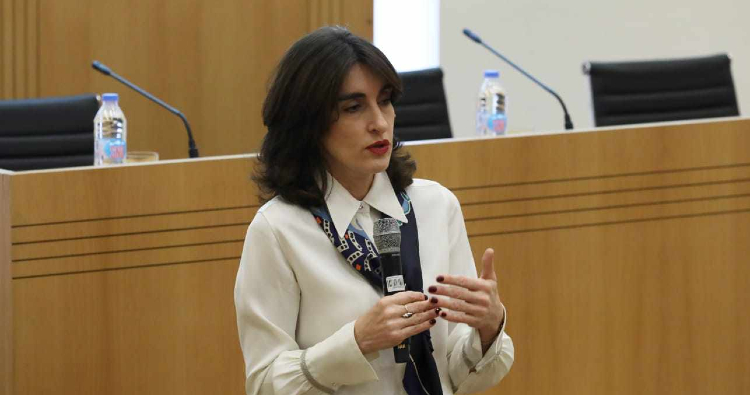Parliament Committee Chair on transparency bill: access to information “legitimate right” of citizens

The ruling party’s reintroduction of the bill, after its original version was retracted last year following public protests, has been met with public protest on Monday, with law enforcement arresting 14 individuals at a rally outside the Parliament during the lawmaking body’s initial hearings of the bill. Photo: Georgian Parliament
Maka Botchorishvili, the Chair of the European Integration Committee of the Georgian Parliament, on Tuesday said access to information was a “legitimate right of citizens”, in response to criticism from some member states of the European Union and domestic opposition over the ruling Georgian Dream party’s reintroduction of a controversial bill on transparency of foreign influence.
Botchorishvili was responding to latest developments over the draft law that calls for registration of non-commercial legal entities and media outlets in the country as “pursuing the interests of a foreign power” if they derive more than 20 percent of their funding from abroad.
She claimed the domestic opposition had “repeatedly demonstrated that they are not interested in participating” in this year's parliamentary elections, adding latest approval ratings meant the parties had “lost all hope” and were “looking to revolutionary scenarios for success” instead.
No matter how much you bully us, no matter how you try to fight against the state, you will not be able to Russianise our European dream, the true Georgian dream. The fight to bring Georgia to EU membership has started, and we will definitely see it through to the end”, she said.
The Committee Chair also addressed organisers of the “no to the Russian law” campaign, launched against the draft law, by saying their effort was “fake because it is impossible to prove the Russian nature of the law”, calling the allegations “groundless and a myth” and alleging the campaign was being carried out by “so-called politicians trained in serving Russian interests”.
Addressing individuals she said were “sincerely worried” about Georgia’s European future and were being “ceaselessly blackmailed” during the ongoing controversy around the legislative initiative, Botchorishvili said urged them “not to believe [...] those who turned their backs on their own homeland at a time of utmost historic significance” last year, in reference to the work that ended in Georgia being granted the European Union membership candidate status.
She alleged the part of domestic opposition had “walked door to door in Brussels attempting to persuade people not to grant” Georgia the status, adding the actions had “supported Russian interests, rather than demanding transparency”.
Let no one think that it is simply me trying to blame something on someone – they themselves admitted this. To this day, they regret that they missed a historic opportunity and failed to achieve results. Because we did not allow them to do so - because we spared no effort to mitigate their insidiousness and fight for the truth”, she claimed.
Botchorishvili urged the public not to believe “representatives of the organisations that spend their funding to write arguments against Georgia's eligibility to run for the EU candidacy” together with Ukraine and Moldova.
These are the people who assessed their homeland more harshly than the toughest arbiter of all – the report of the European Commission. These are the people who stooped so low as to include Georgia among those [supposedly] lagging behind in the ratings that they themselves created”, she said in reference to criticisms of the country’s readiness to obtain the status.
The official said it was “necessary to know how Georgia’s partners’ funds are spent in the country and how they contribute to its genuinely European path” to “ensure a better future for this country and its people”, in reference to the bill’s requirements of disclosure of funding.
She also claimed there was “a lot of talk among member states of the EU about the need of protecting the countries’ democracy and the need for transparency of persons and organisations involved in the political decision-making process”.
The lawmaker added organisations “participating in political life and often shaping or exacerbating the political landscape should not hide the goals of their activities and the sources of their funding from the public”.
Botchorishvili also claimed it was in the domestic authorities' “best interest to sit down at the negotiating table with the EU in a timely manner” to discuss the bloc opening accession talks with the country, adding a “successful holding” of the upcoming elections had been one of the conditions set out for the outcome.
The ruling party’s reintroduction of the bill, after its original version was retracted last year following public protests, has been met with public protest on Monday, with law enforcement arresting 14 individuals at a rally outside the Parliament during the lawmaking body’s initial hearings of the bill.
 Tweet
Tweet  Share
Share